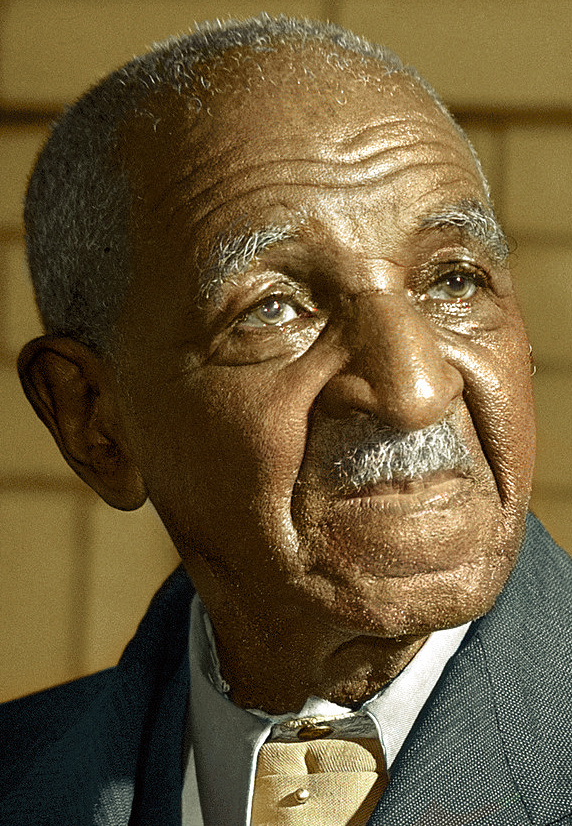Anthracite corporations indicted by federal jury
…
Drastic cuts to bring better distribution, officials say
By Fred Bailey, United Press staff writer
…
British Libyan army pushes nearer Tripoli; Axis bases bombed
By Edward W. Beattie, United Press staff writer
…
New York (UP) –
A former Soviet brigadier general who narrowly escaped being purged in 1937 is a private in the U.S. Army.
The induction of Alexander Barmine Dec. 4 was revealed after he had spent three weeks at the Fort Dix, New Jersey, Reception Center, during which time he concealed his Red Army background from members of his company. He is now in a training battalion in New Jersey.
Barmine fled from his post in Athens in 1937, rather than obey a recall to Moscow and possible execution in the purge of the army general staff. His friend, Marshal Mikhail Tukhachevsky, was liquidated.
Chemical discoveries gave millions to South

Dr. Carver
Tuskegee, Alabama (UP) –
Dr. George Washington Carver, 79, who was born a slave and became one of the greatest of American scientists, died last night.
He had been in failing health for several years, and last month suffered a fall from which he never recovered. He died in his home on the campus of Tuskegee Institute, where he had taught since 1896.
His chemical discoveries, especially of products that can be made from sweet potatoes and peanuts, increased the income of the South many millions of dollars.
He was appointed collaborator in the Bureau of Plant Industry of the U.S. Department of Agriculture in August 1935. He became a member of the Royal Society of Arts, London, in 1917. He was an excellent painter, and the Luxembourg Galleries of Paris wanted one of his paintings, but he declined the honor.
Although he received offers that would have made him a millionaire, he refused to leave Tuskegee, until last year when he did some research in Henry Ford’s Detroit laboratories. His formulas would have made him wealthy, but he gave them freely to the world.
Dr. Carver was never married and left no relatives. In 1940, he gave $33,000 – what was left of his life savings after a bank failure – to create a foundation to perpetuate research in creative chemistry.
He was born of slave parents on the plantation of Moses Carver near Diamond Grove, Missouri, in 1864. Night riders kidnapped him and his mother while he was still a baby. His master ransomed him for a $300 horse, but his mother had already been sold by her abductors and he never saw her again.
American land, sea and air forces strike five blows; 84 more killed on Guadalcanal
…
By William Philip Simms, Scripps-Howard foreign editor
…

By Ernie Pyle
With U.S. forces in Algeria – (by wireless)
Our convoy unloading ports in North Africa are pleasant places to be in – when the Germans are too busy to drop bombs on them, which fortunately is most of the time. Out there on the open docks, the sun beams down warmly, and the air is clear and fresh. Vast quantities of bombs and trucks and guns and food come pouring out of the busy hatches.
Thousands and thousands of American troops unload these ships as they come in. At one port where I recently visited, enough American soldiers to make a good-sized city were working as stevedores. About a fourth of them were colored troops. In addition, there were thousands of Arab stevedores. The Americans are working a three-shift day, right around the clock.
The amount of material pouring out of these ships is impressive. As you stand and look around, you feel that further shipments could be stopped right then, that this is enough. Yet on soberer thought you realize that it is only a drop in the bucket. You realize that the British and Germans in the Middle East have often captured many times this much stuff from each other without stopping the fight. The flood now coming in must continue indefinitely and grow to an absolute cascade before it will be enough.
Convoys arrivals exceed hopes
Convoys are coming through with remarkable safety, even the slow ones. And ships are turned around quickly, though they aren’t approaching any world’s records. With escort ships as scarce as they are, I had supposed that one convoy a fortnight would be a good average. Actually, there are many times that.
There is never a time when there are not ships unloading. There is never a time when new convoys are not about due to take their places. Day by day, the whole of North Africa grows nearer the saturation point with American soldiers, machines of war, and supplies. Before long they will be ready to spill out in a smothering flow over the enemy.
At one port, the commanding officer was given a table of expectancy – he was to have the port ready to unload a certain number of tons per day within a certain time after the occupation. Within a week, he had exactly tripled his goal.
To do that, he had to clear scuttled ships out of the harbor, clear battle debris off the docks, repair damaged utilities, organize thousands of men at the docks.
The whole thing was magnificently planned ahead of time, just as was the whole occupation. For example, they knew just how many ships would be in the harbor. They even assumed that those ships would be sunk or scuttled, and they came prepared to raise them, with soldier-divers trained in England.
Another example of detailed planning: Photographic planes took pictures of the docks. By careful study of the pictures, the Army could tell the exact amount of coal piled on the docks and then figure the total needed to run the utilities and railroads. They brought exactly the amount necessary beyond what was on the docks. It amounted to one whole shipload.
At first, all the thousands of stevedoring troops were quartered in tents right on the docks. Now, they are billeted in empty buildings around the town and in a tent camp out in the country. The men work in brown coveralls and all kinds of headgear.
The Arabs’ working shift is ironically called “the vacation.” Their normal working day consists of two “vacations" of three hours and 20 minutes each, but now they work three hours overtime. They get the going scale here, 50 francs a day, which is about 67¢.
Accidents will happen
In many harbors on the night of the occupation, the French scuttled their ships with a degree of cooperation. That is, on many ships they only opened the seacocks and let the ships ease over on their sides, leaving them in condition to be raised easily.
In other cases, their ships lie on the bottom badly damaged. Even today, you can see masts and funnels sticking above the surface of harbors. Some of the hulks are completely underwater. They impede navigation, but the harbors are usable with careful maneuvering.
Under our arrangements with the local government, French pilots take all ships in and out. They have accidentally run a number of ships over sunken hulks and torn out their bottoms. Diving crews recently worked for two weeks patching a hulk sunk close to the channel, and finally had it ready to start pumping air. They expected it to be afloat the next day. That morning, a ship leaving the harbor with a French pilot somehow happened to hit the submerged hulk, and it tore off all the patches. Now they have to to start all over again. It will take another two weeks to raise the ship.
There are many wars besides the big one up at the front.

By Westbrook Pegler
New York –
In the frankest story yet sent from North Africa, Ernie Pyle writes that our people have left in office a lot of small-fry officials who were put in by the Nazis and who therefore must be pro-Nazi and are permitting fascist societies to continue to exist.
He says:
So, what to do?
Well, the French are politically demented for the time being, and serve no great consideration from an army and a people whose mission in Africa is, incidentally, to free them both there and at home, from Nazi Germany. Eventually, if this sort of thing goes on, the Americans and British, in self-defense and for military reasons, will have to abandon the pretense that we are indifferent to their politics and the actions and attitudes of their civil authorities, establish a firm military control and tell them, not ask them, what to do.
French politics always corrupt
One of the many reasons why France fell was that the nation was politically incoherent and corrupt. There were pro-Nazis and communists who worked at cross purposes but, paradoxically, for the common purpose of destroying the republic. Their press was unbelievably traitorous and venal, and most of their politicians were vile including some who have been held up to us by Red or otherwise radical left-wing refugees and some of our homegrown but expatriate propagandists as high-principled fighters for freedom and democracy.
When forced to it on some past occasions, American commanders in foreign lands have had the capacity to take over and establish military government for the security of their troops and the success of their missions. This could, and judging from Pyle’s account, should be done again.
The French people on the continent have nothing to lose by such a move, unless one takes seriously the orations of Henry Wallace, and believes it is the purpose of the American people to liberate the French colonies and feed and protect them perpetually even against France.
But, whatever they think, American troops that far from home should not be needlessly exposed to treachery by Frenchmen on the ground of a temporary waiver of idealism. A resort to firmness would be a cheap price to pay for lives that otherwise might be thrown away.
Americans’ safety is main issue
After all, the French people should not be given too much to say in this affair. In saving a drowning man, the rescuer has the right to bust him on the chin to stop his threshing and grappling and if the French insist on playing their complex politics to the detriment of the American soldier, they should be made harmless as long as the necessity requires. Those who are worth saving will submit and those who favor the Axis will deserve whatever it is found necessary to do to them.
The Americans are not there to rescue France primarily but to drive the Germans out and invade the continent at the conclusion of which enterprise, France, as an incidental result, will be free again to mess up her affairs as of old, and doubtless will.
American softness no surprise
It is a mistake to think that the Germans invented, and are the only people who practice, firmness on civilians and local politicians who get obstreperous when they are in military occupation of a conquered land. Insist if we must that this territory is not conquered and that the Americans are merely passing through but if their lives depend on it, the soldiers should and, it is hoped, will act accordingly.
Pyle seems naïve, however, in wondering at our softness in dealing with elements of doubtful interest, for he should know that we have been doing that at home ever since 1933. Officially, at least, although certainly not popularly, we have been kind to communists and party-liners. Within 12 hours after Pyle’s story appeared there was published a photograph of Mrs. Roosevelt in a jolly group which included Joe Curran, the president of the National Maritime Union.